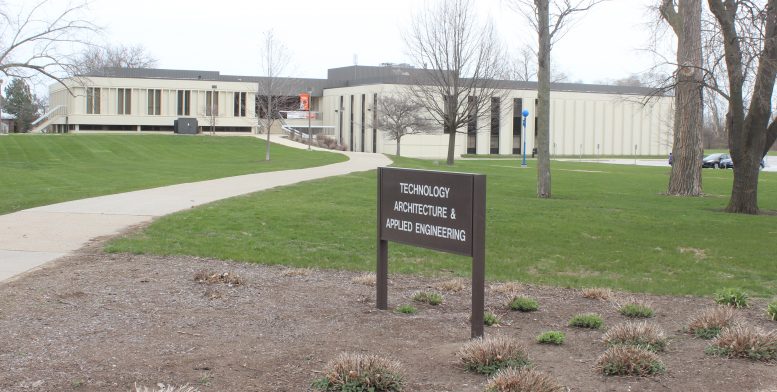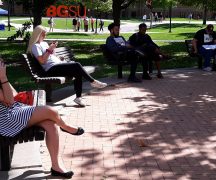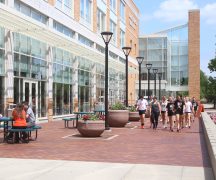By DAVID DUPONT
BG Independent News
The Bowing Green State University Board of Trustees have approved spending $1.6 million to get the renovation of the home of the College of Technology, Architecture, and Applied engineering underway.
The money which comes from funds appropriated by the state legislature will go toward architecture and engineering work. That includes $1 million for studying the building itself, and $630,000 toward studying the infrastructure upgrades needed to support the renovation, said Sheri Stoll, BGSU chief financial officer.
This work will enable university officials to give trustees a “rock solid estimate” of the final cost of the project.
In its capital budget, the state has allocated $16.7 million for the project — $10.4 million for the building, and $6.3 million for infrastructure.
The project is expected to get underway by late 2019, with completion set for summer, 2021.
The building was constructed in 1971 and is getting “a little long in the tooth,” Stoll said.
“The College of Technology, Architecture and Applied Engineers is one of our growing colleges,” she said. As the college programs develop to meet the contemporary needs, “they are in a building not designed or intended for some of those purposes.”
President Rodney Rogers said the programs offered in the college help meet the state’s workforce needs.
The building, he said, was originally designed with an open space concept. That’s been altered over the years. Most recently a robotics lab was added.
During the morning session, the trustees heard good news about enrollment, which is up overall about 1 percent, as well as retention rates, which are just shy of 77.2 percent. The goal is to have 80 percent retention of first year students from fall to fall.
Vice President for Student Affairs Thomas Gibson addressed what the university is doing for segments of the student population who are not returning at as high a rate as others.
These are commuting students, students from underrepresented minority groups, and students in the TRIO program, a federal effort to increase enrollment of low income students and those who are the first in their families to attend college.
For commuter students, the university has created the Falcon FLOC, a program aimed at helping students connect with their peers and feel more a part of campus life.
Also, within a couple weeks, the university will open drop-in offices to provide academic advising in Findlay and Perrysburg.
Commuter students are distinguished from off-campus students, who live near the university and typically have lived in residence halls early in their college careers.
Commuter students, who most often live at home, tend to drop out at a higher rate than their peers.
For TRIO and minority students some of the solutions overlap. Getting more students involved in summer programs was one solution, and prompt intervention at the first sign that they are struggling academically was another.
Gibson also said allowing TRIO students to register early for classes could help address “the summer melt.”
The university is also shifting some scholarship funds to make them available to students from underrepresented minorities.
Interim Provost John Fischer said another group of vulnerable students are those who are admitted “underprepared” in math.
Those students typically are enrolled in a remedial class that does not earn college credit. The university is working on having them enroll in a credit-bearing math class while working on bringing their math skills up to the college level.
Part of this, Fischer said, has to do with societal issues.
Students come in believing they are not good at math, Rogers said. The university needs to show them that they can be successful.





